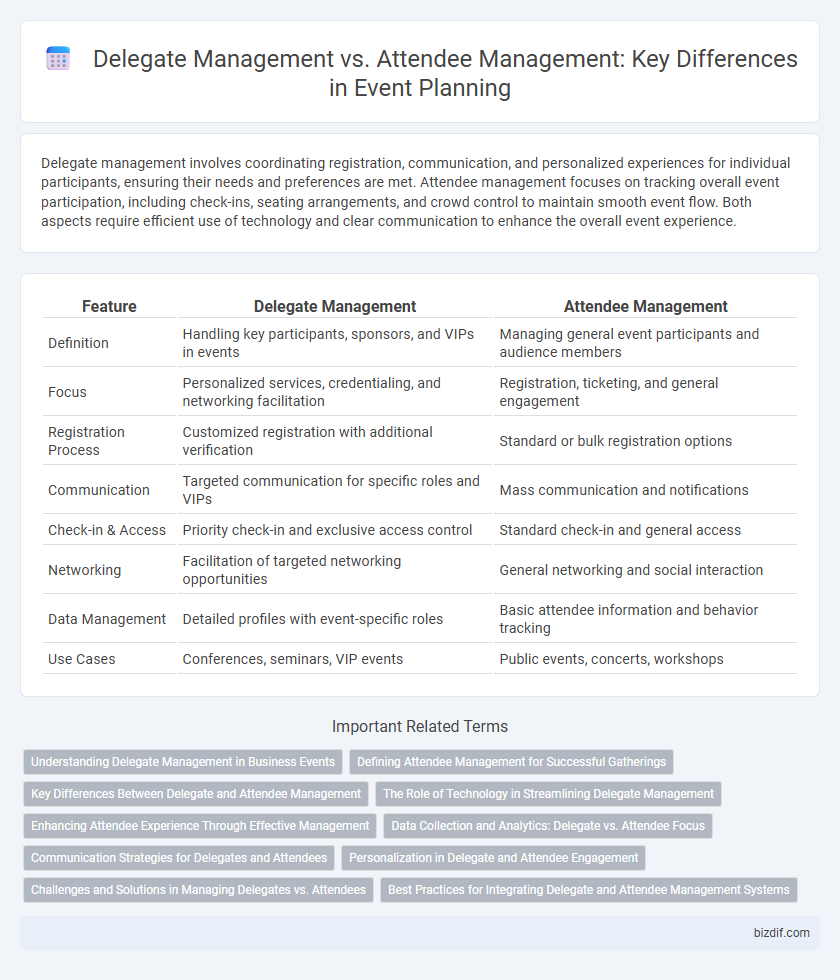Delegate management involves coordinating registration, communication, and personalized experiences for individual participants, ensuring their needs and preferences are met. Attendee management focuses on tracking overall event participation, including check-ins, seating arrangements, and crowd control to maintain smooth event flow. Both aspects require efficient use of technology and clear communication to enhance the overall event experience.
Table of Comparison
| Feature | Delegate Management | Attendee Management |
|---|---|---|
| Definition | Handling key participants, sponsors, and VIPs in events | Managing general event participants and audience members |
| Focus | Personalized services, credentialing, and networking facilitation | Registration, ticketing, and general engagement |
| Registration Process | Customized registration with additional verification | Standard or bulk registration options |
| Communication | Targeted communication for specific roles and VIPs | Mass communication and notifications |
| Check-in & Access | Priority check-in and exclusive access control | Standard check-in and general access |
| Networking | Facilitation of targeted networking opportunities | General networking and social interaction |
| Data Management | Detailed profiles with event-specific roles | Basic attendee information and behavior tracking |
| Use Cases | Conferences, seminars, VIP events | Public events, concerts, workshops |
Understanding Delegate Management in Business Events
Delegate management in business events involves organizing, coordinating, and engaging key participants who often represent companies or organizations, ensuring their specific needs and objectives are met for maximum impact. It includes tasks such as registration, communication, personalized scheduling, and facilitating networking opportunities tailored to professional roles. Effective delegate management enhances event ROI by fostering meaningful interactions, securing sponsor satisfaction, and driving business outcomes.
Defining Attendee Management for Successful Gatherings
Attendee management involves organizing and overseeing all aspects of participants attending an event, including registration, communication, check-in processes, and post-event feedback collection. Effective attendee management ensures accurate tracking of participant data, personalized engagement, and efficient on-site operations to enhance the overall event experience. Prioritizing attendee management contributes to higher satisfaction rates and smoother logistical coordination during successful gatherings.
Key Differences Between Delegate and Attendee Management
Delegate management involves coordinating individuals with specific roles, responsibilities, and often decision-making authority within an event, emphasizing personalized communication and access control. Attendee management focuses on handling the general participant population, including registration, ticketing, and ensuring a smooth experience for large groups. Key differences include the level of customization, role-based access, and the complexity of interactions, where delegate management requires more tailored engagement strategies compared to broader attendee management processes.
The Role of Technology in Streamlining Delegate Management
Technology streamlines delegate management by automating registration, session tracking, and personalized communication, which enhances efficiency and engagement. Advanced event management platforms integrate real-time analytics and mobile apps, allowing organizers to monitor delegate behavior and preferences effectively. This contrasts with attendee management, which often focuses on broader access control and general event logistics rather than individualized delegate interactions.
Enhancing Attendee Experience Through Effective Management
Effective delegate management involves coordinating speakers, VIPs, and key participants to ensure smooth event flow and relevant content delivery, while attendee management focuses on registration, engagement, and personalized communication. Integrating both approaches enhances the attendee experience by minimizing wait times, facilitating networking opportunities, and providing tailored event interactions through data-driven insights. Advanced management tools enable seamless check-ins, real-time updates, and feedback collection, creating a dynamic and responsive environment for all event participants.
Data Collection and Analytics: Delegate vs. Attendee Focus
Delegate management emphasizes collecting professional data such as job titles, company affiliations, and decision-making authority to tailor event content and networking opportunities. Attendee management focuses on gathering personal preferences, session interests, and engagement metrics to enhance the overall participant experience. Analytical insights from delegate data support strategic business goals, while attendee data drives personalized interactions and satisfaction improvements.
Communication Strategies for Delegates and Attendees
Effective communication strategies for delegate management prioritize personalized messaging, real-time updates, and clear instructions to ensure smooth coordination and engagement. Attendee management communication focuses on broad information dissemination, timely event reminders, and interactive channels to enhance participant experience and satisfaction. Leveraging segmentation and targeted content helps optimize outreach and fosters stronger connections with both delegates and attendees.
Personalization in Delegate and Attendee Engagement
Delegate management emphasizes personalized communication and tailored experiences based on professional roles and responsibilities, enhancing engagement through targeted networking and session customization. Attendee management focuses on individual preferences and interests, using data analytics to deliver personalized content, notifications, and social interactions that increase satisfaction and participation. Both approaches leverage segmentation and behavior tracking to optimize personalization, driving higher engagement levels throughout the event lifecycle.
Challenges and Solutions in Managing Delegates vs. Attendees
Delegate management often involves coordinating high-profile individuals with specific requirements, creating challenges in personalized communication, security protocols, and VIP accommodation logistics. In contrast, attendee management focuses on handling large volumes of participants, emphasizing efficient registration, crowd control, and real-time information dissemination. Leveraging advanced event management software can streamline delegate tracking with customized profiles, while scalable check-in systems and mobile apps optimize attendee engagement and reduce bottlenecks.
Best Practices for Integrating Delegate and Attendee Management Systems
Integrating delegate and attendee management systems enhances event coordination by centralizing registration data, streamlining communication, and improving personalized experiences. Best practices include synchronizing databases to maintain real-time updates, ensuring user-friendly interfaces for easy access by organizers and participants, and leveraging automated workflows to reduce manual errors. Prioritizing data security and compliance with privacy regulations also strengthens trust and efficiency in managing event participants.
Delegate management vs Attendee management Infographic

 bizdif.com
bizdif.com